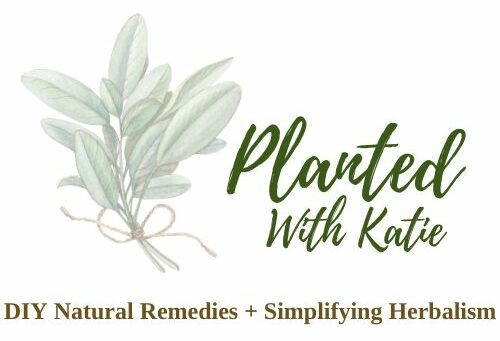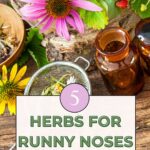5 Natural Herbs For Runny Nose And Cold Symptoms
Let's take a closer look at 5 natural herbs for runny nose and cold symptoms. We’ll explore how each herb works, how to use them effectively, and the best ways to incorporate them into your routine to relieve cold symptoms.
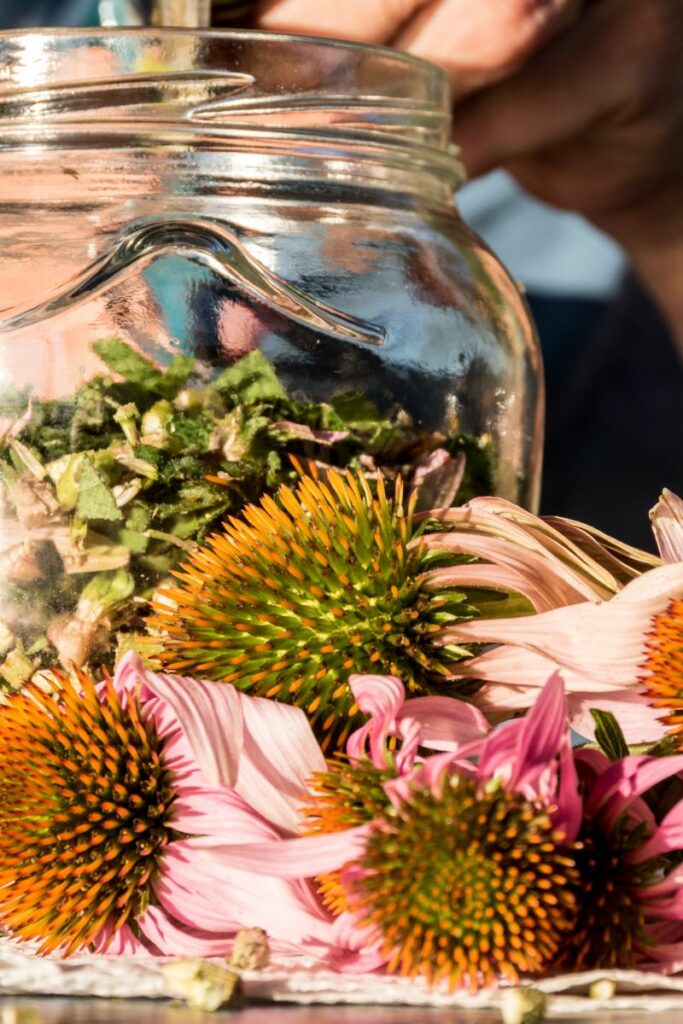
Disclaimer: This is not medical advice. Information and statements shown here are for educational and informational purposes only and are not to replace the advice of your healthcare professional.
This post may include affiliate links. Please refer to our disclaimer for full disclosure.
When you have a runny nose and cold symptoms, it can be really uncomfortable. Your nasal passages get clogged, you might feel stuffy, and it’s hard to breathe. These symptoms can be caused by various things like viral infections, sinus infections, or even allergies like hay fever and allergic rhinitis.
Herbal remedies offer natural ways to help clear nasal passages, reduce mucus buildup, and make you feel better without relying on harsh chemicals. Many people prefer herbal medicine because it works gently with the body, has fewer side effects, and can provide other health benefits.
Using natural remedies for runny nose and cold symptoms is a good idea because they often come with additional health benefits. For example, some herbs have anti-inflammatory properties that can help reduce sinus congestion and swelling. Others can boost your immune system, helping your body fight off the underlying cause of your symptoms. Natural remedies can also be a great alternative to over-the-counter medications, which sometimes have unwanted side effects.
By learning about these herbs and how to use them, you can find relief from your symptoms and support your overall health. Whether you prefer herbal teas, steam inhalation, or topical applications, there are plenty of natural ways to feel better during the cold and flu season. Let's dive into the world of herbal remedies and discover how these amazing plants can help you breathe easier and feel more comfortable.
5 Natural Herbs For Runny Nose And Cold Symptoms
1. Echinacea
Echinacea is a powerful herb that helps boost the immune system. It’s known for its ability to reduce the severity and duration of cold symptoms. When you have a runny nose or a stuffy nose, Echinacea can help your body fight off the viral infections that cause these symptoms. It can also help with upper respiratory infections and sinus issues, making it easier to breathe and feel better faster.

How to Use Echinacea
Echinacea Tea: One of the best ways to use Echinacea is by making a hot tea. To prepare Echinacea tea, steep one teaspoon of dried Echinacea in a cup of hot water for about 10 minutes. Drinking this tea 2-3 times a day can provide relief from cold symptoms.
Supplements: Echinacea is also available in supplement form. You can take Echinacea capsules or tablets as directed on the packaging. This is a convenient option if you’re on the go.
Tinctures: Echinacea tinctures are liquid extracts that you can take by adding a few drops to water or juice. Follow the dosage instructions on the tincture bottle for best results.
Scientific Evidence For Echinacea
Many studies support the effectiveness of Echinacea in reducing cold symptoms. For example, a review of 14 clinical trials found that Echinacea can reduce the duration of colds by 1.4 days and decrease the chances of developing a cold by 58%. Echinacea helps increase the number of white blood cells in your body, which are crucial for fighting infections.
Researchers have found that Echinacea contains active ingredients like alkamides, glycoproteins, and polysaccharides, which have antiviral and anti-inflammatory properties. These properties help reduce the symptoms of a runny nose, sinus congestion, and chest congestion. Echinacea is considered a safe and natural remedy that has been used for centuries in herbal medicine to treat various ailments.
Using Echinacea is a good idea when you feel the onset of cold symptoms. It can help boost your immune system and make your cold less severe, helping you get back to your normal routine more quickly. Always consult a healthcare provider before starting any new supplement, especially if you have a medical condition or are taking other medications.
Echinacea is one of the favorite herbs of many people because of its long history of use and proven health benefits. Incorporating Echinacea into your cold and flu season routine can be an effective way to stay healthy and manage symptoms naturally.
2. Elderberry
Elderberry is a powerful herb that is rich in antioxidants. Antioxidants help protect your cells from damage and boost your immune system. Elderberry also fights inflammation, which can help reduce the swelling in your nasal passages that causes a stuffy nose. This makes elderberry a great herbal remedy for reducing cold symptoms, including sinus congestion and chest congestion.
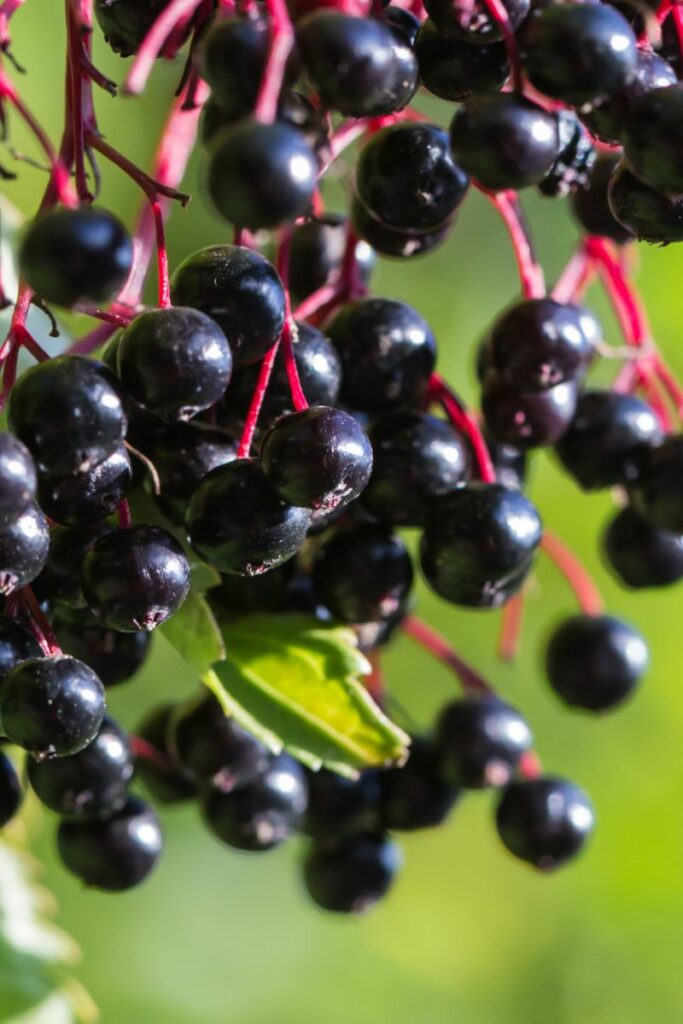
How to Use Elderberry
Elderberry Syrup: One of the best ways to use elderberry is in syrup form. Elderberry syrup can be bought at the store or made at home by boiling elderberries with water and honey. Taking a spoonful of elderberry syrup a few times a day can help reduce cold symptoms.
Elderberry Gummies: Elderberry gummies are another convenient way to get the benefits of this herb. These gummies are usually sweet and can be a fun way for both kids and adults to take elderberry. Follow the dosage instructions on the packaging for best results.
Elderberry Tea: Elderberry tea is made by steeping dried elderberries in hot water. To make elderberry tea, steep one teaspoon of dried elderberries in a cup of hot water for about 10 minutes. Drinking this hot tea 2-3 times a day can help soothe a runny nose and reduce other cold symptoms.
Scientific Evidence For Elderberry
Research has shown that elderberry can be effective in reducing the duration and severity of cold and flu symptoms. A study found that taking elderberry extract could reduce the length of flu symptoms by about four days. Another study showed that elderberry could reduce the severity of cold symptoms, making it easier to get through flu season without feeling too miserable.
Elderberry contains active ingredients like flavonoids, which have strong antiviral and anti-inflammatory properties. These properties help reduce symptoms like sinus congestion, nasal cavity inflammation, and mucus buildup. Elderberry has been used in traditional Chinese medicine and Western medicine for its health benefits and is considered a safe and effective natural remedy.
Using elderberry is a good idea when you start feeling cold or flu symptoms. It can help boost your immune system and make your symptoms less severe, helping you recover more quickly. Always consult a healthcare provider before starting any new supplement, especially if you have a medical condition or are taking other medications.
Elderberry is one of the favorite herbs of many people because of its long history of use and proven health benefits. Incorporating elderberry into your routine during the cold and flu season can be an effective way to stay healthy and manage symptoms naturally.
3. Peppermint
Peppermint is a well-known herb that provides several benefits for people with runny nose and cold symptoms. It helps relieve nasal congestion by opening up the nasal passages and reducing mucus buildup. Peppermint also soothes the throat and provides a cooling sensation, making it easier to breathe. It’s particularly helpful for sinus congestion and upper respiratory infections.
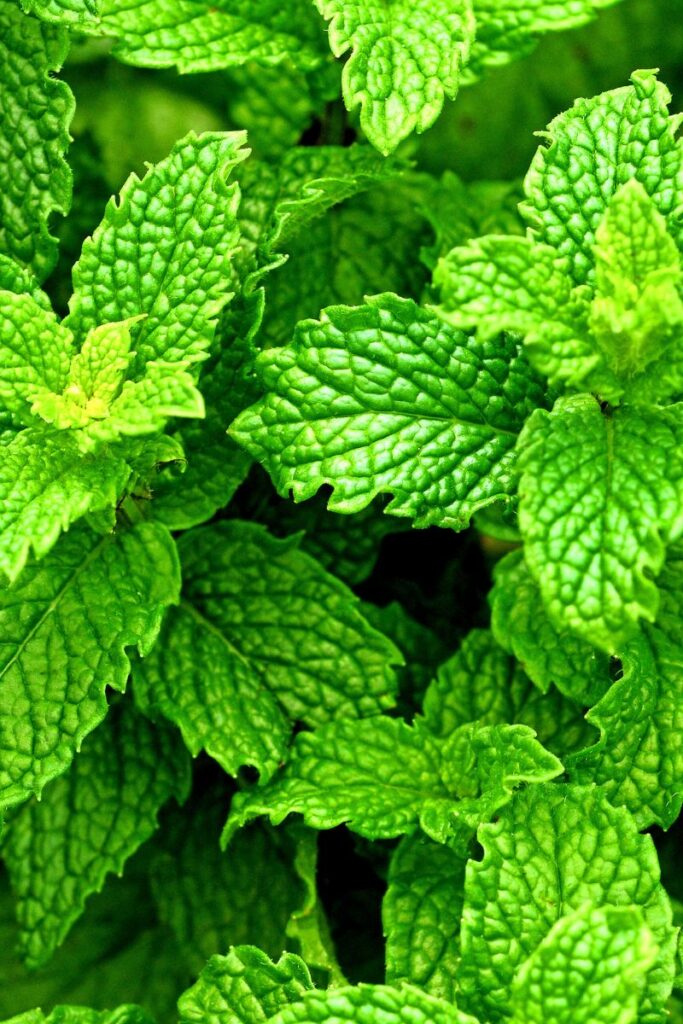
How to Use Peppermint
Peppermint Tea: One of the best ways to use peppermint is by drinking hot peppermint tea. To make the tea, steep one teaspoon of dried peppermint leaves in a cup of hot water for about 10 minutes. Drinking peppermint tea 2-3 times a day can help clear nasal passages and soothe a stuffy nose.
Essential Oil Inhalation: Peppermint essential oil can be used for steam inhalation. Add a few drops of peppermint oil to a bowl of hot water, cover your head with a towel, and inhale the steam. This can help reduce sinus congestion and open up the nasal cavities.
Lozenges: Peppermint lozenges are another easy way to benefit from this herb. These lozenges can soothe the throat and help clear nasal passages, providing quick relief from cold symptoms.
Scientific Evidence For Peppermint
Research has shown that peppermint can be effective in treating cold symptoms. A study found that inhaling menthol, the active ingredient in peppermint, can improve nasal airflow and reduce the sensation of nasal congestion. Another study showed that peppermint oil has antibacterial and antiviral properties, which can help fight the infections causing cold symptoms.
Peppermint contains volatile oils like menthol, which have strong decongestant and soothing effects. These properties help reduce symptoms like sinus congestion, chest congestion, and throat irritation. Peppermint has been used in herbal medicine and traditional Chinese medicine for its health benefits and is considered a safe and effective natural remedy.
Using peppermint is a good idea when you have a runny nose or cold symptoms. It can help clear your nasal passages, soothe your throat, and make you feel more comfortable. Always consult a healthcare provider before starting any new remedy, especially if you have a medical condition or are taking other medications.
Peppermint is one of the favorite herbs of many people because of its long history of use and proven health benefits. Incorporating peppermint into your routine during the cold and flu season can be an effective way to stay healthy and manage symptoms naturally.
4. Ginger
Ginger is a powerful herb that provides several benefits, especially when you have a runny nose and cold symptoms. It has strong anti-inflammatory properties, which help reduce swelling in your nasal passages and relieve sinus congestion. Ginger also soothes a sore throat and helps reduce nausea, which is common when you have a cold or flu. This makes ginger a great herbal remedy for various upper respiratory infections and flu symptoms.
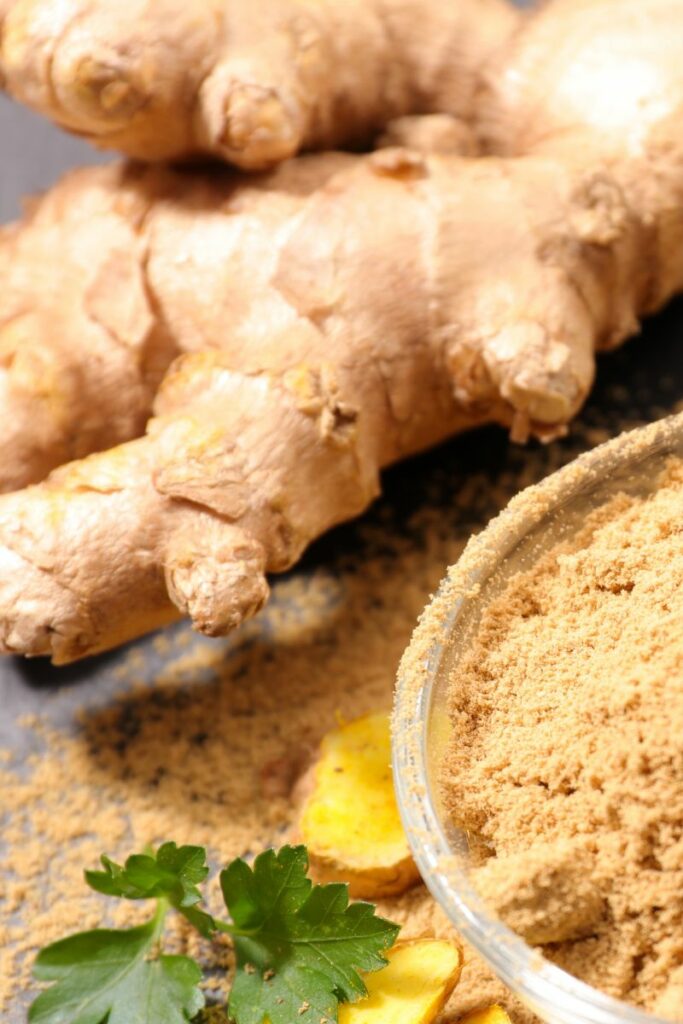
How to Use Ginger
Ginger Tea: One of the best ways to use ginger is by drinking hot ginger tea. To make ginger tea, slice a small piece of fresh or dried ginger root and steep it in a cup of hot water for about 10 minutes. You can add a little honey and lemon for extra flavor and health benefits. Drinking ginger tea 2-3 times a day can help clear nasal passages and soothe a sore throat.
Fresh Ginger Root: You can also chew small amounts of fresh ginger root to relieve symptoms quickly. This is a good idea if you feel nauseous or have a sore throat. Just make sure to use a small piece because ginger is quite strong.
Ginger Supplements: Ginger supplements are another convenient way to get the benefits of this herb. You can find ginger capsules or tablets at most health stores. Follow the dosage instructions on the packaging for best results.
Scientific Evidence For Ginger
Research has shown that ginger can be effective in alleviating cold symptoms. A study found that ginger has anti-inflammatory and antioxidant effects, which help reduce inflammation in the mucous membranes and improve symptoms of a runny nose and sinus congestion. Another study showed that ginger can boost the immune system by increasing the production of white blood cells, which are crucial for fighting infections.
Ginger contains active ingredients like gingerol, which have strong antibacterial and antiviral properties. These properties help reduce symptoms like chest congestion, mucus buildup, and throat irritation. Ginger has been used in herbal medicine and traditional Chinese medicine for its health benefits and is considered a safe and effective natural remedy.
Using ginger is a good idea when you have a runny nose or cold symptoms. It can help clear your nasal passages, soothe your throat, and reduce nausea. Always consult a healthcare provider before starting any new remedy, especially if you have a medical condition or are taking other medications.
Ginger is one of the favorite herbs of many people because of its long history of use and proven health benefits. Incorporating ginger into your routine during the cold and flu season can be an effective way to stay healthy and manage symptoms naturally.
5. Chamomile
Chamomile is a gentle and effective herb that offers many benefits, especially when you have a runny nose and cold symptoms. Chamomile helps calm and soothe the body, making it easier to relax and get some sleep, which is important when you're feeling sick. It also has anti-inflammatory properties that reduce inflammation in the nasal passages and mucous membranes, helping to relieve sinus congestion and a stuffy nose.
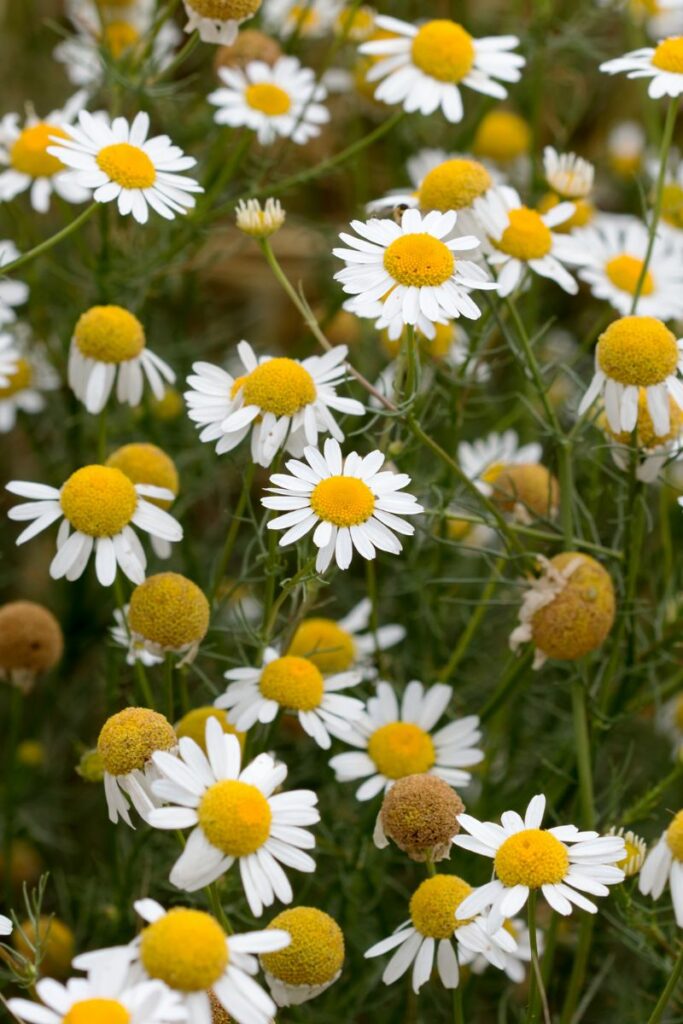
How to Use Chamomile
Chamomile Tea: One of the best ways to use chamomile is by drinking hot chamomile tea. To make chamomile tea, steep one teaspoon of dried chamomile flowers in a cup of hot water for about 10 minutes. Drinking chamomile tea 2-3 times a day can help calm your body, reduce inflammation, and improve cold symptoms.
Chamomile Extracts: Chamomile extracts are available in liquid form and can be added to water or other beverages. Follow the dosage instructions on the packaging for best results.
Inhalation: You can also use chamomile for steam inhalation. Add a few drops of chamomile essential oil to a bowl of hot water, cover your head with a towel, and inhale the steam. This can help clear nasal passages and reduce sinus congestion.
Scientific Evidence For Chamomile
Research has shown that chamomile can be effective in alleviating cold symptoms and promoting relaxation. A study found that inhaling steam with chamomile extract helped reduce symptoms of the common cold, such as nasal congestion and runny nose. Another study showed that chamomile tea has a calming effect on the body and can help improve sleep quality, which is important for recovery when you’re sick.
Chamomile contains active ingredients like apigenin, which has strong anti-inflammatory and antioxidant properties. These properties help reduce symptoms like sinus congestion, mucus buildup, and throat irritation. Chamomile has been used in herbal medicine and traditional Chinese medicine for its health benefits and is considered a safe and effective natural remedy.
Using chamomile is a good idea when you have a runny nose or cold symptoms. It can help calm your body, improve your sleep, and reduce inflammation. Always consult a healthcare provider before starting any new remedy, especially if you have a medical condition or are taking other medications.
Chamomile is one of the favorite herbs of many people because of its long history of use and proven health benefits. Incorporating chamomile into your routine during the cold and flu season can be an effective way to stay healthy and manage symptoms naturally.
How to Incorporate These Herbs into Your Routine
Daily Use
- Echinacea Tea: Drink echinacea tea 2-3 times a day to boost your immune system and reduce cold symptoms.
- Elderberry Syrup: Take a spoonful of elderberry syrup a few times a day during cold and flu season.
- Peppermint Tea: Enjoy a cup of peppermint tea 2-3 times a day to relieve nasal congestion and soothe your throat.
- Ginger Tea: Drink ginger tea 2-3 times a day to reduce inflammation and soothe a sore throat.
- Chamomile Tea: Sip on chamomile tea 2-3 times a day to calm your body, reduce inflammation, and improve sleep quality.
Combining Herbs for Maximum Effect
- Morning Routine: Start your day with a cup of ginger tea to reduce inflammation and boost your immune system. Follow it with a cup of echinacea tea to support your immune function.
- Midday Boost: Have a cup of peppermint tea to clear nasal passages and soothe any throat irritation. Take elderberry syrup to help reduce cold symptoms.
- Evening Relaxation: End your day with a cup of chamomile tea to calm your body and improve sleep. If needed, add a drop of peppermint essential oil to a bowl of hot water for steam inhalation before bed to clear nasal passages.

Safety Considerations
Proper Dosages:
- Echinacea: Follow the recommended dosage on the tea or supplement packaging. Typically, 1 teaspoon of dried echinacea per cup of water for tea, or as directed on supplement labels.
- Elderberry: For syrup, follow the instructions on the bottle, usually 1-2 teaspoons several times a day. For gummies or capsules, adhere to the recommended dosage.
- Peppermint: Drink 1-2 cups of peppermint tea per day. Use a few drops of peppermint essential oil in hot water for steam inhalation.
- Ginger: Use 1 teaspoon of fresh ginger per cup of tea, or take ginger supplements as directed.
- Chamomile: Steep 1 teaspoon of dried chamomile flowers in hot water for tea, or use chamomile extract as directed.
Potential Allergies:
- Echinacea: Some people may be allergic to echinacea, especially those allergic to plants in the daisy family. Perform a patch test if you’re unsure.
- Elderberry: Raw elderberries can be toxic. Always use cooked or commercially prepared elderberry products.
- Peppermint: Peppermint can cause allergic reactions in some people. Start with small amounts to ensure you don’t have a reaction.
- Ginger: Ginger is generally safe, but excessive amounts can cause stomach upset. Stick to recommended dosages.
- Chamomile: People allergic to ragweed or other plants in the daisy family may also be allergic to chamomile. Perform a patch test if you’re unsure.
General Advice:
- Consult a Healthcare Provider: Always talk to your healthcare provider before starting any new herbal remedy, especially if you have a medical condition or are taking other medications.
- Monitor for Reactions: Pay attention to how your body responds to each herb. If you experience any adverse reactions, stop using the herb and consult your healthcare provider.
By following these practical tips and safety considerations, you can effectively incorporate these natural herbs into your daily routine to help manage runny nose and cold symptoms.
Additional Natural Remedies for Cold Symptoms
Honey
Honey is a natural remedy that has been used for centuries to soothe sore throats and coughs. It has antibacterial properties that can help fight infections and reduce cold symptoms. Honey also acts as a natural cough suppressant and helps coat the throat, providing relief from irritation.
Usage Tips:
- Honey Tea: Add a tablespoon of honey to a cup of hot water or herbal tea. Drink it several times a day to soothe your throat and reduce coughing.
- Honey and Lemon: Mix honey with lemon juice in warm water for a soothing drink that can help reduce cold symptoms.
- Honey on Its Own: Take a teaspoon of honey straight from the jar to help soothe a sore throat and suppress a cough.
Garlic
Garlic is known for its strong antibacterial and antiviral properties. It helps boost the immune system, making it easier for your body to fight off colds and other infections. Garlic also contains compounds that can help reduce the severity and duration of cold symptoms.
Usage Tips:
- Raw Garlic: Eating raw garlic can be very effective. Chop or crush a clove of garlic and let it sit for a few minutes to release its beneficial compounds before consuming it. Try this honey fermented garlic recipe for potent immune support!
- Garlic in Food: Add garlic to soups, stews, and other dishes to enjoy its health benefits. Cooking garlic can still provide some benefits, although raw garlic is more potent.
- Garlic Supplements: If the taste of raw garlic is too strong, you can take garlic supplements as directed on the packaging.
Hydration
Staying hydrated is crucial when you have a cold. Proper hydration helps thin mucus, making it easier to expel and reducing nasal congestion. It also keeps your throat moist, helping to soothe irritation and coughing. Additionally, staying hydrated helps your body function properly and supports the immune system in fighting off infections.
Tips for Fluid Intake:
- Drink Plenty of Water: Aim to drink at least 8 glasses of water a day. Keep a water bottle with you to remind yourself to drink regularly.
- Hot Teas: Enjoy herbal teas like chamomile, peppermint, or ginger tea to stay hydrated and benefit from their soothing properties.
- Broths and Soups: Consume clear broths and soups, such as chicken noodle soup, which provide fluids and nutrients to help you feel better.
- Avoid Dehydrating Drinks: Limit or avoid drinks that can dehydrate you, such as caffeinated beverages and alcohol.
By incorporating honey, garlic, and proper hydration into your routine, you can help alleviate cold symptoms and support your body’s natural healing process. These additional natural remedies are simple, effective ways to manage cold symptoms and improve your overall health.
Frequently Asked Questions
Can I Use These Herbs for Children?
Yes, many of these herbs can be used for children, but it's important to adjust the dosage appropriately and consult with a healthcare provider before use. Some herbs may be too strong for young children or may cause allergic reactions. For example:
Echinacea: Generally safe for children, but consult with a doctor for appropriate dosages.
Elderberry: Elderberry syrup is often given to children in reduced doses.
Peppermint: Peppermint tea can be given to older children, but essential oils should be used with caution.
Ginger: Ginger can be given to children in small amounts, such as in ginger tea.
Chamomile: Chamomile tea is usually safe for children, but monitor for any allergic reactions, especially if they are allergic to plants in the daisy family.
How Quickly Can I Expect Relief from These Herbs?
The time it takes to see relief from these herbs can vary depending on the individual and the severity of symptoms:
Echinacea: Relief might be noticed within a few days of regular use.
Elderberry: Symptoms may start to improve within 2-3 days, with the duration of cold symptoms potentially shortened.
Peppermint: Relief from congestion and throat irritation can often be felt shortly after drinking peppermint tea or using peppermint steam inhalation.
Ginger: Benefits such as reduced inflammation and soothed throat can be felt within a day or two of consistent use.
Chamomile: Calming effects and improved sleep can be experienced within a few days of drinking chamomile tea regularly.
Are There Any Side Effects of Using These Herbs?
While these herbs are generally safe, some individuals may experience side effects or allergic reactions. It's important to be aware of these potential issues and consult a healthcare provider if you have concerns:
Echinacea: Some people may experience allergic reactions, especially those allergic to plants in the daisy family. Symptoms can include rash, itching, and swelling.
Elderberry: Raw elderberries are toxic and should not be consumed. Always use cooked or commercially prepared products to avoid nausea, vomiting, and diarrhea.
Peppermint: Peppermint can cause heartburn in some people. Essential oils should be used with caution to avoid skin irritation or allergic reactions.
Ginger: High doses of ginger can cause stomach upset, heartburn, and diarrhea. Stick to recommended amounts.
Chamomile: People allergic to ragweed or other plants in the daisy family may also be allergic to chamomile. Symptoms can include rash, itching, and swelling.
Conclusion
Using natural herbs to manage runny nose and cold symptoms can be an effective and gentle way to support your health. Echinacea boosts the immune system, elderberry is rich in antioxidants and fights inflammation, peppermint relieves nasal congestion, ginger soothes the throat and reduces nausea, and chamomile calms the body and helps with sleep.
I encourage you to try these natural remedies to help alleviate your cold symptoms. Incorporating these herbs into your daily routine can provide relief and support your overall well-being. Remember to be patient, as natural remedies can take some time to show results. Share your experiences with these herbs and let others know how they have helped you.
References
- Shah, S. A., Sander, S., White, C. M., Rinaldi, M., & Coleman, C. I. (2007). "Evaluation of echinacea for the prevention and treatment of the common cold: a meta-analysis." The Lancet Infectious Diseases, 7(7), 473-480.
- Karsch-Völk, M., Barrett, B., Kiefer, D., Bauer, R., & Ardjomand-Woelkart, K. (2015). "Echinacea for preventing and treating the common cold." Cochrane Database of Systematic Reviews, (2).
- Barnes, J., Anderson, L. A., & Gibbons, S. (2005). "Echinacea species (Echinacea angustifolia (DC.) Hell., Echinacea pallida (Nutt.) Nutt., Echinacea purpurea (L.) Moench): A review of their chemistry, pharmacology and clinical properties." Journal of Pharmacy and Pharmacology, 57(8), 929-954.
- Zakay-Rones, Z., Thom, E., Wollan, T., & Wadstein, J. (2004). "Randomized study of the efficacy and safety of oral elderberry extract in the treatment of influenza A and B virus infections." The Journal of International Medical Research, 32(2), 132-140.
- Tiralongo, E., Wee, S. S., & Lea, R. A. (2016). "Elderberry supplementation reduces cold duration and symptoms in air-travelers: A randomized, double-blind placebo-controlled clinical trial." Nutrients, 8(4), 182.
- Ulbricht, C., Basch, E., Cheung, L., Goldberg, H., Hammerness, P., Isaac, R., ... & Woods, J. (2014). "An evidence-based systematic review of elderberry and elderflower (Sambucus nigra) by the Natural Standard Research Collaboration." Journal of Dietary Supplements, 11(1), 80-120.
- Eccles, R. (2003). "Menthol and related cooling compounds." Journal of Pharmacy and Pharmacology, 55(8), 1021-1036.
- McKay, D. L., & Blumberg, J. B. (2006). "A review of the bioactivity and potential health benefits of peppermint tea (Mentha piperita L.)." Phytotherapy Research, 20(8), 619-633.
- Grzanna, R., Lindmark, L., & Frondoza, C. G. (2005). "Ginger--an herbal medicinal product with broad anti-inflammatory actions." Journal of Medicinal Food, 8(2), 125-132.
- Ali, B. H., Blunden, G., Tanira, M. O., & Nemmar, A. (2008). "Some phytochemical, pharmacological and toxicological properties of ginger (Zingiber officinale): A review of recent research." Food and Chemical Toxicology, 46(2), 409-420.
- Rahmani, A. H., Shabrmi, F. M., & Aly, S. M. (2014). "Active ingredients of ginger as potential candidates in the prevention and treatment of diseases via modulation of biological activities." International Journal of Physiology, Pathophysiology and Pharmacology, 6(2), 125-136.
- McKay, D. L., & Blumberg, J. B. (2006). "A review of the bioactivity and potential health benefits of chamomile tea (Matricaria recutita L.)." Phytotherapy Research, 20(7), 519-530.
- Al Anbaki, M., Al Hasnawi, M. R., & Alsalman, A. J. (2015). "The effects of chamomile extract on cold symptoms in children." Journal of Pediatric Nursing, 30(1), 104-109.
- Singh, O., Khanam, Z., Misra, N., & Srivastava, M. K. (2011). "Chamomile (Matricaria chamomilla L.): An overview." Pharmacognosy Reviews, 5(9), 82-95.
